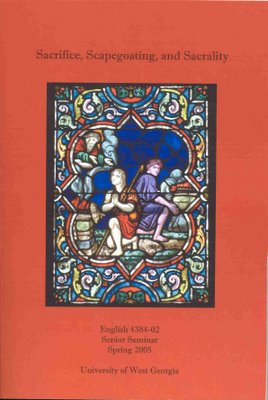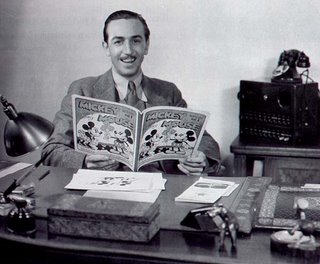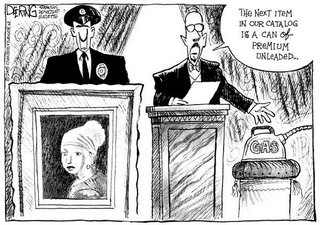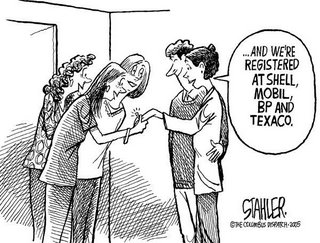Organized Religion and the "Sheltered Life"
(Note: This is a long post, so prepare yourselves. I really like it, though. I especially like the last few paragraphs, where I talk about social groups and Jesus . . .)
Those of you who know me, know that I am a "good girl." I'm probably one of the straightest-looking 24-year-olds on this planet. I look like I stay away from drugs, love my parents, believe in God, and go to church every Sunday. And I do. My appearance is in no way deceiving.
So all my life, I've had people tell me I'm "sheltered." (I think most, if not all, of those people were acquaintances and friends of friends. So what does that tell you?) I bore it because I thought the sentiment was only one of adolescence. "It's just a bunch of my angst-ridden peers trying to figure out who they are," I thought. Well, I was recently surprised when I heard a couple of people make the same kind of comments about me and people like me. And neither one of them are in high school anymore.
The argument, I suppose, goes like this: Your appearance is a reflection of your experience in life. That is, if you look modest and plain, you've had the good life. You haven't been through bad experiences. And because you haven't been through traumatic experiences, you don't know what the "real" world is like -- you're sheltered. The converse, then, must be true: If you look "bad" and rebellious, you've been through some tough times. You've seen life as it "really" is, and you're now open-minded about everything. So everyone who has had a hard life gets piercings, tattoos, does drugs, wears black, etc, etc?
When I put it that way, it sounds ridiculous, doesn't it? But that's basically what people mean when they call me sheltered. I'll put aside the "Well, what's real?" argument for now and ask a few questions. What does it really mean to be sheltered, anyway? How can you be the judge about whether someone is or isn't? Do you have to "experience" things in order to be "real?"
I think I've already answered the second question. Well, that is, people think they can be a judge of others by the way they look. And one can make some pretty accurate assumptions based on appearance sometimes. But in my experience, I've found that the majority of people base their assumptions on whether or not someone is involved in an organized religion. (Let me add that if the organized religion is The Church of Jesus Christ of Latter-Day Saints, the ignorant assumptions increase about tenfold.) Because I am an ardent follower of my faith and corresponding religious organization, acquaintances often think I will be prudish and unaccepting of different ideas. When they find out that I am sometimes very silly and like to learn and discuss lots of new things, they say, "Oh, yeah, you're a mormon. But you're different." As if I'm the exception to all of those "backward idiot fundamentalist Christians?"
The thing about organized religious denominations is that they're made up of groups of people with similar religious beliefs. With those beliefs in certain principles comes condemnation of others. If a group has a collective set of morals, is it not fair and just that they make a set of rules? Can they not disagree with alternative lifestyles? Can they not spend their free time with mostly the friends who have similar interests and beliefs? Of course they can, as does every other group on this planet. That's why we form groups!
But the minute a group does this, the group members are called sheltered. Now that's a tricky word. "Sheltered" denotes "protected." But contemporary usage connotes ignorance and intolerance. So yes, as a girl growing up in a middle-class family, I had all the proper arrangements in life -- food, clothing, and a safe home. But does that make me ignorant and intolerant? I should say not! My parents were formally educated, and they love to learn. They taught me that same principle. My church is a huge advocate for education, especially for the education of women. In fact, I study other religions besides Christianity -- GASP! But I don't follow their doctrines because I don't believe in their gospels 100%.
What I'm saying is that education -- not experience -- is one of the keys to being well-informed and smart. If you believe in Jesus Christ, you believe that he is the only perfect person who has ever lived on this earth. He is the most wise and understanding of anyone, too. How can this be? According to contemporary society, he should be the most ignorant fool of any of us because he didn't drink, smoke, run around with women, or grow up in the slums of Jerusalem. It sounds silly, I know. But my point is that to experience something is not the key to understanding. Listening is. Learning is. Serving is.
So just because I dress in plain clothes, hang out with my straight-laced friends, and grew up in a safe home with loving parents, does not mean I don't know what it's like to feel pain, to be different, or to understand someone else's point of view.
Yeah. So take THAT, all of you people who call me sheltered! :)
Thing I'm thankful for: those of you who actually read to the bottom of this post. It meant a lot to me at the time I wrote it, mostly because someone had just indirectly called me sheltered, and it bothered me -- as it always does. Anyway, thanks for reading. I know that interesting stories with accompanying pictures are more fun to read.




















